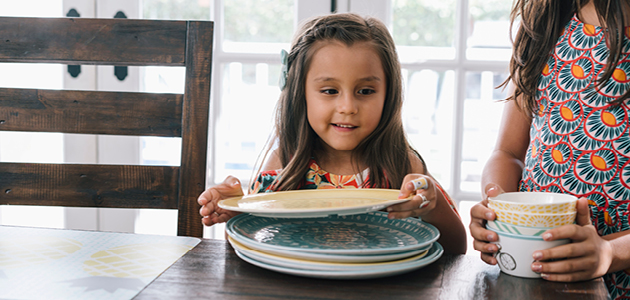The idea of doing household chores might not seem overly appealing to kids at first, but whether they admit it or not, children do enjoy being given a bit of age-appropriate responsibility around the house. You can help make it happen with consistency and praise – and by lowering your expectations just a little bit.
Different jobs for different ages
According to WebMD1, even kids as young as two or three can be responsible for simple, one- or two-step tasks like putting their toys away, putting their clothes in the hamper, and wiping up spills. Just think about how quickly a toddler catches on to the way digital devices work. Their bright little minds can certainly manage simple chores too!
What chores might older kids be tasked with doing around the house? WebMD suggests the following:
Ages 4 – 5
- Making their bed
- Emptying a wastebasket
- Watering flowers
- Washing plastic dishes at the sink
- Fixing a bowl of cereal
- Pulling weeds
- Using a hand-held vacuum to pick up crumbs
Ages 6 – 7
- Any of the above, plus:
- Sorting laundry
- Sweeping floors
- Setting and clearing the table
- Helping to make and pack lunch
- Keeping their bedroom tidy
Ages 8 – 9
- Any of the above, plus:
- Loading the dishwasher
- Putting away groceries
- Vacuuming
- Helping to make dinner
- Fixing their own snacks
- Putting away their own laundry
- Cooking simple foods, such as toast
- Mopping the floor
Ages 10 and older
- Any of the above, plus:
- Unloading the dishwasher
- Folding laundry
- Cleaning the bathroom
- Washing windows
- Washing the car
- Cooking simple meals with supervision
- Doing laundry
- Cleaning the kitchen
- Changing their bed sheets
Making it happen
First, don’t insist on perfection. A 5-year-old probably isn’t going to make the bed quite as neatly as you would – and you have to accept that that’s okay. The idea is to make them responsible for the tasks, so stepping in to “fix” their work undermines the process. Show them how to do the job, then let them try it while you supervise. After that, they can fly solo. They will get better with time and experience, and finding out that you can learn and improve by doing is an incredibly important life skill for kids to master.
Make sure you praise your kids during and after they complete their assigned chores. Humans of all ages thrive on positive reinforcement, so recognize their efforts by acknowledging the work they’re doing. Remember, this is also an opportunity to point out how important their help is and how their efforts are contributing to the successful running of the household.
To keep everyone organized and aware of the tasks they are responsible for, you might consider posting chore charts in a common area of your home so that no one can claim they didn’t know what they were supposed to be doing. Children will enjoy the satisfaction of checking chores off their list and knowing that everyone can see what they’ve accomplished.
Finally, be consistent. Make sure your kids actually do their assigned chores, because letting them off the hook and doing their chores for them every once in a while is a slippery slope.
Should allowance be tied to chores?
Some people tie allowance to chores, but other schools of thought suggest that kids shouldn’t be paid for tasks they should be responsible for doing anyway. It’s up to you to decide what works best for your family, but one tactic is to tie allowance to extra chores that are above and beyond a child’s usual tasks.
We all want to feel needed and important, and making kids responsible for chores they can easily be expected to handle is one way to give them that sense of pride and accomplishment.
SOURCES
1 https://www.webmd.com/parenting/features/chores-for-children
420818 CAN/US (07/22)




